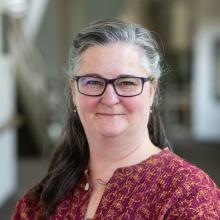Member Spotlight: Stacey S. Horn
Professor and Department Head, Family Social Science, University of Minnesota; SRCD SOGIE Caucus Chair and Past Chair, previous SRCD Equity and Justice committee Chair and Member
Why did you decide to choose Developmental Science as a course of study or career?
I started out my career as a high school teacher and academic advisor and learned pretty quickly that I was really interested in adolescents' lives outside the classroom, as well as schools and communities as contexts for adolescents' social development. As a teacher, I also became involved in service-learning and service-leadership which sparked my interest in youth agency and purpose. I knew I was interested in adolescent development in educational and community contexts so applied to Ph.D. programs in Human Development (all in colleges of education)!
Is there a mentor or mentors who have been instrumental to your career and, if so, who and how?
I was luck to have a mentor, Melanie Killen, who has not only been instrumental to my success as a graduate student and professional, but who also connected me to a larger network of scholars and mentors focused on social cognitive domain theory and social development. I have an incredible network of people who have been supportive throughout my career--many of whom have become good friends.
What advice would you give to a Graduate student beginning their Ph.D. studies in Developmental Science or related?
Find your people. Cultivate relationships. Seek out mentors whose work you admire, whose careers you admire, and whose ways of being you admire.
What is your best SRCD memory?
I have great memories being at the beginning of the development of the SRCD Equity and Justice Committee and serving on the committee (and eventually as Chair) in the early years. A major highlight of mine, however, was being part of the team that established the Sexual Orientation and Gender Identity/Expression Caucus and seeing how that has grown and expanded over the years.
Why did you join the SOGIE Caucus and how does it facilitate connection among members all year long?
I was a founding steering committee member of the SOGIE Caucus. Partly we wanted to start the caucus to formalize some of the informal networks and connections that had already been established in SRCD. The caucus is a great place to find support as a scholar who identifies as queer as well as a scholar who studies sexual orientation and gender identity.
